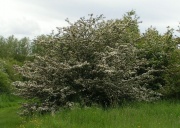Difference between revisions of "Hawthorn"
Jump to navigation
Jump to search
(username removed) |
|||
| (One intermediate revision by one other user not shown) | |||
| Line 6: | Line 6: | ||
== Synonyms and Related Terms == | == Synonyms and Related Terms == | ||
| − | Cratageus; haw; thornapple; Tjørn (Dan.); Weißdorn (Deut.); aubépine (Fr.); meidoorn (Ned.); hagtornarv (Sven.) | + | ''Cratageus''; haw; thornapple; Tjørn (Dan.); Weißdorn (Deut.); aubépine (Fr.); meidoorn (Ned.); hagtornarv (Sven.) |
| − | == | + | ==Physical and Chemical Properties== |
| − | Dense shrub or hedge growing to 8 m. Bark=smooth gray brown turning darker with age. Twigs=most have 1 inch thorns. Leaves= variable ( 5-10 cm long) and serrated or lobed. Fruit= small pomes ( 0.5 cm), red when mature in fall. | + | * Dense shrub or hedge growing to 8 m. |
| + | * Bark=smooth gray brown turning darker with age. | ||
| + | * Twigs=most have 1 inch thorns. | ||
| + | * Leaves= variable ( 5-10 cm long) and serrated or lobed. | ||
| + | * Fruit= small pomes ( 0.5 cm), red when mature in fall. | ||
| − | == | + | ==Resources and Citations== |
| − | Schoch, W., Heller, I., Schweingruber, F.H., Kienast, F., 2004:[http://www.woodanatomy.ch/ Wood anatomy of central European Species]: Pomaceous Fruit:Common Hawthorn, [http://www.woodanatomy.ch/species.php?code=CRMO Crataegus monogyna] | + | * Schoch, W., Heller, I., Schweingruber, F.H., Kienast, F., 2004:[http://www.woodanatomy.ch/ Wood anatomy of central European Species]: Pomaceous Fruit:Common Hawthorn, [http://www.woodanatomy.ch/species.php?code=CRMO Crataegus monogyna] |
| − | |||
| − | |||
* Hermann Kuhn, ''Conservation and Restoration of Works of Art and Antiquities'', Butterworths, London, 1986 | * Hermann Kuhn, ''Conservation and Restoration of Works of Art and Antiquities'', Butterworths, London, 1986 | ||
| − | * ''Encyclopedia Britannica'', http://www.britannica.com Comment: "Hawthorn." | + | * ''Encyclopedia Britannica'', http://www.britannica.com Comment: "Hawthorn." Accessed 6 May 2004 . |
| − | * | + | * : Virginia Tech Dendrology website at www.fw.vt.edu/dendro/dendrology/main.htm (Accessed Dec. 9, 2005) |
| − | * Wikipedia | + | * Wikipedia: http://en.wikipedia.org/wiki/Crataegus (Accessed Dec. 9, 2005) |
* Random House, ''Webster's Encyclopedic Unabridged Dictionary of the English Language'', Grammercy Book, New York, 1997 | * Random House, ''Webster's Encyclopedic Unabridged Dictionary of the English Language'', Grammercy Book, New York, 1997 | ||
Latest revision as of 16:56, 3 August 2022
Description
Any of several species of spiny shrubs from the rose family (genus Cratageus) native to Europe and North America. Hawthorns produce small red or black fruit that are used in an ink recipe written by Theophilus in De Diversis Artibus (Kuhn 1986).
Synonyms and Related Terms
Cratageus; haw; thornapple; Tjørn (Dan.); Weißdorn (Deut.); aubépine (Fr.); meidoorn (Ned.); hagtornarv (Sven.)
Physical and Chemical Properties
- Dense shrub or hedge growing to 8 m.
- Bark=smooth gray brown turning darker with age.
- Twigs=most have 1 inch thorns.
- Leaves= variable ( 5-10 cm long) and serrated or lobed.
- Fruit= small pomes ( 0.5 cm), red when mature in fall.
Resources and Citations
- Schoch, W., Heller, I., Schweingruber, F.H., Kienast, F., 2004:Wood anatomy of central European Species: Pomaceous Fruit:Common Hawthorn, Crataegus monogyna
- Hermann Kuhn, Conservation and Restoration of Works of Art and Antiquities, Butterworths, London, 1986
- Encyclopedia Britannica, http://www.britannica.com Comment: "Hawthorn." Accessed 6 May 2004 .
- : Virginia Tech Dendrology website at www.fw.vt.edu/dendro/dendrology/main.htm (Accessed Dec. 9, 2005)
- Wikipedia: http://en.wikipedia.org/wiki/Crataegus (Accessed Dec. 9, 2005)
- Random House, Webster's Encyclopedic Unabridged Dictionary of the English Language, Grammercy Book, New York, 1997
- The American Heritage Dictionary or Encarta, via Microsoft Bookshelf 98, Microsoft Corp., 1998
